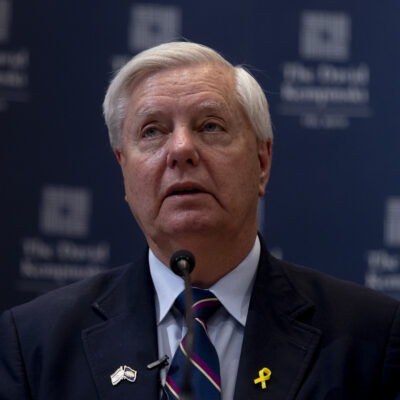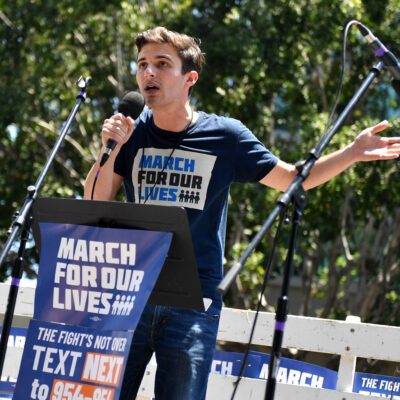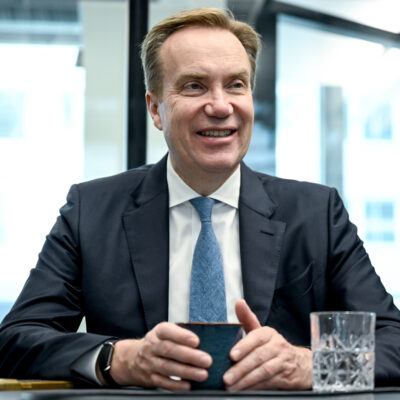
Isaac Brekken/AP
As the next mayor of Las Vegas, Shelley Berkley marks her ‘last hurrah’ in public office
The former longtime congresswoman and Jewish Democrat says her new role ‘is definitely the last elected office I will hold’
After more than 10 years away from government, Shelley Berkley, a former longtime congresswoman from southern Nevada, will be marking her return to public office on Wednesday, when she is sworn in as the new mayor of Las Vegas.
For Berkley, a Jewish Democrat who retired last year from her role as senior vice president of the Touro University system, the chance to represent her home city as its chief executive is a capstone to what she characterized as a lifelong commitment to public service.
In a recent interview with Jewish Insider, Berkley, 73, said she has no intention of seeking higher office and that her mayoral tenure will be “last hurrah” as an elected official.
“In a way, that’s very liberating,” Berkley said, listing a number of issues she hopes to address in the job, such as affordable housing, homelessness and rising antisemitism, among other things. The mayorship is “definitely the last elected office I will hold,” she stressed, “and I think that’s a wonderful way to end a career.”
Berkley, who will succeed the term-limited mayor, Carolyn Goodman, first entered public office in the early 1980s, when she won a seat in Nevada’s state Assembly. Later, she served for 14 years in Congress representing the Las Vegas area, during which time she built a reputation as one of the most prominent supporters of Israel in the House.
The former congresswoman narrowly lost a bid for Senate in 2012, amid a House ethics investigation into allegations that she used her position to benefit her husband’s medical practice. Her mayoral victory last month, when she claimed 53% of the vote over her Republican opponent, is a redemption of sorts for Berkley, who said she has no desire to return to Washington, D.C., after leaving federal office eleven years ago.
“How remarkable to be able to do public service all day and all night and then actually sleep in my own bed,” said Berkley, a New York native whose family settled in Las Vegas in the 1960s, when she recalled that there was just one synagogue in the emerging desert metropolis.
Now, she told JI, there are “at least 23” synagogues in Las Vegas — which is home to a growing Jewish community. Next month, Berkley will participate in an annual menorah lighting ceremony in downtown Las Vegas to celebrate Hanukkah, “which I’m very excited about,” she said.
Berkley, a descendant of Greek and Russian Jews who escaped the Holocaust, has long been actively engaged in Jewish communal life. She has served for more than four decades on the executive board of the Anti-Defamation League in Nevada, she said. In 2021, Berkley was named a co-chair of the Jewish Federations of North America’s security and antisemitism committee. The incoming mayor also sits on the board of directors of Democratic Majority for Israel.
“I have very deep and wide ties with the Jewish community,” Berkley told JI. “I’m very much a part of it — and they know that they have a champion in me.”
Her family’s history, she has often said, has driven her involvement in politics — especially now as she prepares for what she insists is her final act in a city known for second chances.
“For me, public service has always been my way of giving something back to our country for not only taking my family in and giving us a chance to survive — but we certainly have thrived in America,” Berkley said. “That has always been my motivating factor for public service.”
The interview has been edited and condensed for clarity.
Jewish Insider: How does it feel to be returning to elected office again?
Shelley Berkley: I’m thrilled with the results of the election. I was working at Touro University. I was the CEO, and I’d been there for nine and a half years and decided that it was time for me to retire from Touro. I absolutely loved it, but I thought maybe it’s a good idea to leave when everything is going well and I can turn over a very successful institution to the next person. We did a one-year extension of my contract, and then I started thinking, What are you going to do with the rest of your life? What do you love?
I love public service. I have no interest in going back to Washington, D.C. I did that already. I have no interest in going up to Carson City in the winter. I did that already. It occurred to me that the mayor of Las Vegas was termed out, and between Carolyn Goodman and her husband, Oscar [Goodman], they had been mayors of the city for 25 years. I thought, ‘how remarkable to be able to do public service all day and all night and then actually sleep in my own bed — and also Las Vegas.’
My family moved here when I was 12, so it’s my hometown, and to be mayor of your hometown is nothing short of extraordinary. For the next few days, I will be getting very intense instruction on the city, which, of course, I have called home for over 60 years. Four generations of my family have called Las Vegas home, and for such a young city, that’s an extraordinary number.
JI: During the campaign, you frequently cited your family’s history of coming to the U.S. to escape the Holocaust. How does that influence your approach to public office?
SB: I grew up hearing stories from my grandmothers — I knew my grandfathers — about what life was like, where they came from. My mother’s side is from Salonika, Greece. Half of the population of Salonika was Jewish before the war, and by the time the Nazis finished with us, there were only 1,000 Jews left in Salonika. I am quite certain my family would not have been among the 1,000 chosen to live. My father’s side of the family was from the Russia-Poland border — an entire civilization that had existed in that part of the world was exterminated. Had they stayed in Europe, my parents would have never been born — and consequently I would have never existed.
For me, public service has always been my way of giving something back to our country for not only taking my family in and giving us a chance to survive — but we certainly have thrived in America. That has always been my motivating factor for public service. I’m going to tell this story when I get sworn in — not everybody knows it — but my father was a waiter in upstate New York at one of the resort hotels, the Concord. It was the early ’60s, and he was having a very hard time making a living, so one night he put my sister and I and the dog in the back seat of our car, with my parents in the front seat. Everything we owned was in a U-Haul hooked up to the back bumper. We drove across the country in the middle of the summer, no air conditioning. My dad had a letter of recommendation to get a job as a waiter in Southern California.
We got to the Hoover Dam after a hellacious trip; it was just miserable. We’re only a few hours away from our destination, and my parents, who I thought were so old — they were 31 and 34 at the time — wanted to see Las Vegas. We never knew if we were coming back East again. This was such a major move for my family. We left everything we knew and loved in New York, and we didn’t have much of a say in it. They defined that they would come to Las Vegas for the night. They just wanted to see Las Vegas, and we never left. We made a life for ourselves in the middle of the desert, and that first summer, I honestly thought my parents took me to hell. It was miserably hot, and I missed my friends and my family and everything else. But then I started school, and I never looked back. This community has provided extraordinary opportunity for my family, and we are very grateful to it.
JI: What was the Jewish community in Las Vegas like when you arrived, and how has it evolved since then?
SB: The entire community was small. There were only about 80,000 people in the entire Las Vegas Valley. Now there’s two and a half million and growing in the same geographical area. I was in one synagogue, Temple Beth Sholom, which, of course, my mother joined immediately. We were on reduced dues because we didn’t have any money when we arrived in Las Vegas, but my mother knew that we needed to affiliate with a synagogue as quickly as possible, and that’s exactly what we did. My dad went down to the union, and they sent him out to the old Sands Hotel. By the time the Sands was imploded, my dad was the longest-serving employee, and he had gone from being a waiter to being maître d’ of the famed Copa room for many, many years by then. I started my political career when I returned home from law school, and that’s what I always aspired to do.
So this worked out beautifully for my family. We grew up within the Jewish community. Now, of course, I believe there are at least 23, if not more, synagogues in town, including four Chabads, Young Israel, Orthodox, Reform, Conservative. We have representation throughout the community.
JI: How do you feel your new position as mayor differs from your past roles in the state legislature and in federal office?
SB: It’s still public service, but there’s a different role to play. Being mayor is a very high-visibility position. You are on the ground all the time and very accessible. People expect, and particularly in Las Vegas, they expect to see their mayor, and they have no qualms about coming over while you’re having dinner, breakfast, lunch, wherever you are, to talk to you about whatever issue is on their mind. I am very comfortable with that. The issues that are front and center here are mostly growth-related issues. We have our challenges — there’s no doubt about that — but I would rather be mayor of a city that is growing and has growth-related challenges than be mayor of a city that’s constricting, losing its population and losing its tax base. I think the next 10 years in the city of Las Vegas and all of southern Nevada are going to be transformative.
JI: What are your top priorities as you prepare to take over as mayor?
SB: There’s a local issue, but it is very impactful: We’ve got to settle the Badlands controversy. I don’t want to go into a lot of information about that, but it is first and foremost on my mind. We have also got a serious challenge with homelessness and figuring out what to do with that growing population. Small businesses should not be compromised because homeless people are sleeping in front of their business and preventing customers from going in. My larger business is gaming, the economic engine that drives this train. I’m very familiar with the gaming industry and very supportive, and I want to continue to see this community develop and grow.
There’s a couple of other issues that are very important. We have a serious shortage of affordable housing. and we’re working to address that. When my family came to town, after a few years we bought our first house. It cost $33,000. It was not the Taj Mahal, but it gave us roots in the community. We were property owners. We belonged here, and I know that feeling is in the hearts of thousands of Las Vegas residents who need a safe and clean place for their children to grow and blossom.
JI: Are you looking forward to participating in any of the ceremonial duties the mayorship also entails?
SB: I will be doing my first Fremont Street menorah lighting on Hanukkah, which I’m very excited about.
JI: Is there anything you can do as mayor to address hate crimes and antisemitism? There have been some recent reports showing that antisemitic incidents have increased in Las Vegas and Nevada more broadly.
SB: I’ve been on the executive board of the Anti-Defamation League in Las Vegas for the last 40 years, and yet you have properly identified an issue we are experiencing worldwide and unfortunately in the United States as well. I have very deep and wide ties with the Jewish community. I’m very much a part of it — and they know that they have a champion in me. I will not tolerate discrimination, prejudice, antisemitism or racism from anywhere to anyone. I will speak out and work to protect all the people of the city of Las Vegas, and that includes the Jewish community.
JI: Do you think there will be any opportunities for you as mayor to strengthen ties between Israel and Las Vegas?
SB: I am a big believer in sister cities. My predecessors were not. It’s not the top priority for me — there are other things I have to initiate and work on — but I like the idea of sister cities. I think it connects us with the rest of the world — certainly Israel, India, Taiwan. There are a number of countries I would like to partner with. Now, it’s important to recognize that Las Vegas has a city manager form of government, so the power does not reside in the mayor’s office. However, the beauty of being mayor is that you have a bully pulpit, and I intend to use that to discuss things that may not necessarily be in the mayor’s job description, like transportation and education.
JI: Given his ties to Las Vegas, have you crossed paths with President-elect Donald Trump previously, and do you think there are any areas of common ground you can find to potentially work with him when you’re mayor?
SB: We’re going to have to wait and see. Las Vegas has needs. I’m hoping to be able to work with my congressional delegation in order to provide funding for some of the things that are desperately needed as we continue to grow. I have met Donald Trump. I’m sure he would not remember me, but the president of the United States is obviously a very pivotal person, not only in our country but throughout the world. I look forward to working with anybody who’s going to help me represent the city of Las Vegas.
JI: You must be relieved Sen. Jacky Rosen (D-NV) was reelected.
SB: Yes, yes, yes. I never had a doubt that she was going to win, but she did give me a couple of missing heartbeats on election night. She’s a very conscientious, hard-working senator who cares about her community and her state and the people who live here, and so I think the voters made the correct choice in that race.
JI: This question is perhaps premature, but do you have any ambitions to run for higher office?
SB: No, this is my last hurrah, and in a way, that’s very liberating. When you’re first getting started — and let’s face it, I started running in the early ’80s, for heaven’s sakes — you’re doing your job, but you always have one eye on your next job. I have been liberated from that. Mayor of Las Vegas is definitely the last elected office I will hold, and I think that’s a wonderful way to end a career.






